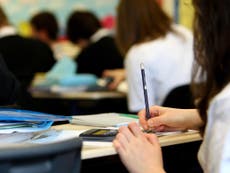Most extra Covid costs faced by schools not covered by government support, report finds
Union leader says help available for these expenses has been ‘piecemeal’ and ‘extremely limited in scope’

Most of the extra coronavirus-related costs schools are facing will not be covered by the government’s support fund, a new report has found.
Headteachers have budgets-government-b1719396.html">previously told The Independent they were dipping into existing budgets or covering staff in the classroom themselves to deal with the financial challenges arising from the pandemic.
While the government has provided some financial relief to schools through its exceptional costs fund, the Education Policy Insitute (EPI) has suggested the majority of schools' additional costs will not be met by the fund.
The think-tank has estimated just 31 per cent of the combined total of all schools’ coronavirus-related costs in England will be reimbursed by the government’s exceptional cost fund.
The EPI has estimated less than a third of all school Covid-related costs will be reimbursed by the government’s support fund.
The analysis finds that nearly all schools reported extra spending on personal protective equipment (PPE) and cleaning supplies, while the vast majority faced increased costs in signage, digital equipment and handwashing facilities.
Since the start of the national lockdown in March, primary schools have had to meet additional non-staff costs that averaged just under £13,000. Special schools have faced additional non-staff costs averaging just under £18,000 and secondary schools nearly £43,000, the EPI report said.
The research, which is based on a survey of more than 700 schools in November, suggests that nearly three in five schools are using their reserves in order to cover these extra costs - and around half of schools do not expect to have a balanced budget by the end of the year.
School leaders spoke to The Independent in November about the difficulty of footing their own coronavirus costs, as the government reimbursement scheme for certain expenses only covered costs until the end of the 2020 summer term.
Kit Andrew, headteacher at St James the Great primary school in London, told The Independent he was spending “a week’s budget of cleaning supplies per day” at the time.
A parliamentary petition – which has been signed thousands of times – has also called for the government to fully fund schools for their coronavirus costs and to provide relief from lost income.
Last month, the Department for Education (DfE) unveiled a short-term Covid workforce fund to help schools and colleges cover the costs of staff absence due to the pandemic.
The fund, which will be backdated to 1 November and cover the last half-term, will only be available to schools and colleges facing high levels of staff absences, or significant budget pressures.
Over summer, Boris Johnson announced a £1bn “catch-up package” to help pupils in England make up lost learning time following months of school closures - which includes a £350m national programme to provide the most disadvantaged children with tutors over the current academic year.
“It is essential that schools are on a stable financial footing, with sufficient resources to support their pupils,” Bobbie Mills, report author and senior researcher at EPI, said.
“Despite recent increases in school funding, budgets are likely to be under increased pressure as a result of the extra costs incurred this year, with schools serving disadvantaged areas facing some of the biggest challenges.”
She added: "The government needs to look at how it can offer further support to schools through this uncertain period."
Geoff Barton from the Association of School and College Leaders (ASCL), said: “Budgets were already very tight because of years of government underfunding and the position is now even worse.”
The union’s general secretary added: "The small amount of financial support which the government has made available for extra costs during the emergency has been piecemeal, extremely limited in scope, and inadequate."
Paul Whiteman, general secretary of school leaders' union NAHT, said: "Government claims that they are supporting schools fully are clearly false."
A DfE spokesperson said: "We recently launched the Covid workforce fund to support schools and colleges facing significant budget pressures and staff absences.
“That comes on top of the exceptional costs fund which ran earlier this year, which gave each school the opportunity to claim up to £75,000, based on their size.”
They added: "Schools have also continued to receive their core funding throughout the pandemic, with this year marking the first year of our investment of £14.4bn in total over the three years to 2022-23 - the largest increase in a decade. We continue to keep additional funding required under review."
Additional reporting by Press Association
Subscribe to Independent Premium to bookmark this article
Want to bookmark your favourite articles and stories to read or reference later? Start your Independent Premium subscription today.






Join our commenting forum
Join thought-provoking conversations, follow other Independent readers and see their replies
Comments